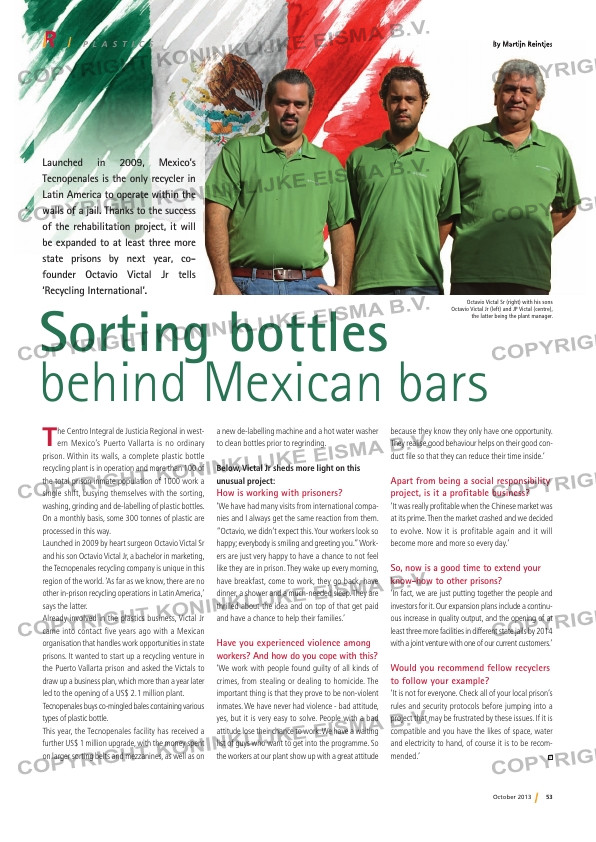Page 53 from: October 2013

53October 2013
The Centro Integral de Justicia Regional in west-ern Mexico’s Puerto Vallarta is no ordinary
prison. Within its walls, a complete plastic bottle
recycling plant is in operation and more than 100 of
the total prison inmate population of 1000 work a
single shift, busying themselves with the sorting,
washing, grinding and de-labelling of plastic bottles.
On a monthly basis, some 300 tonnes of plastic are
processed in this way.
Launched in 2009 by heart surgeon Octavio Victal Sr
and his son Octavio Victal Jr, a bachelor in marketing,
the Tecnopenales recycling company is unique in this
region of the world. ‘As far as we know, there are no
other in-prison recycling operations in Latin America,’
says the latter.
Already involved in the plastics business, Victal Jr
came into contact fi ve years ago with a Mexican
organisation that handles work opportunities in state
prisons. It wanted to start up a recycling venture in
the Puerto Vallarta prison and asked the Victals to
draw up a business plan, which more than a year later
led to the opening of a US$ 2.1 million plant.
Tecnopenales buys co-mingled bales containing various
types of plastic bottle.
This year, the Tecnopenales facility has received a
further US$ 1 million upgrade, with the money spent
on larger sorting belts and mezzanines, as well as on
a new de-labelling machine and a hot water washer
to clean bottles prior to regrinding.
Below, Victal Jr sheds more light on this
unusual project:
How is working with prisoners?
‘We have had many visits from international compa-
nies and I always get the same reaction from them.
“Octavio, we didn’t expect this. Your workers look so
happy; everybody is smiling and greeting you.” Work-
ers are just very happy to have a chance to not feel
like they are in prison. They wake up every morning,
have breakfast, come to work, they go back, have
dinner, a shower and a much-needed sleep. They are
thrilled about the idea and on top of that get paid
and have a chance to help their families.’
Have you experienced violence among
workers? And how do you cope with this?
‘We work with people found guilty of all kinds of
crimes, from stealing or dealing to homicide. The
important thing is that they prove to be non-violent
inmates. We have never had violence – bad attitude,
yes, but it is very easy to solve. People with a bad
attitude lose their chance to work. We have a waiting
list of guys who want to get into the programme. So
the workers at our plant show up with a great attitude
because they know they only have one opportunity.
They realise good behaviour helps on their good con-
duct fi le so that they can reduce their time inside.’
Apart from being a social responsibility
project, is it a profi table business?
‘It was really profi table when the Chinese market was
at its prime. Then the market crashed and we decided
to evolve. Now it is profitable again and it will
become more and more so every day.’
So, now is a good time to extend your
know-how to other prisons?
‘In fact, we are just putting together the people and
investors for it. Our expansion plans include a continu-
ous increase in quality output, and the opening of at
least three more facilities in different state jails by 2014
with a joint venture with one of our current customers.’
Would you recommend fellow recyclers
to follow your example?
‘It is not for everyone. Check all of your local prison’s
rules and security protocols before jumping into a
project that may be frustrated by these issues. If it is
compatible and you have the likes of space, water
and electricity to hand, of course it is to be recom-
mended.’
P L A S T I C S By Martijn Reintjes
Sorting bottles
behind Mexican bars
Launched in 2009, Mexico’s
Tecnopenales is the only recycler in
Latin America to operate within the
walls of a jail. Thanks to the success
of the rehabilitation project, it will
be expanded to at least three more
state prisons by next year, co-
founder Octavio Victal Jr tells
‘Recycling International’.
Octavio Victal Sr (right) with his sons
Octavio Victal Jr (left) and JP Victal (centre),
the latter being the plant manager.
p00_Prison rehab.indd 53 03-10-13 10:07



